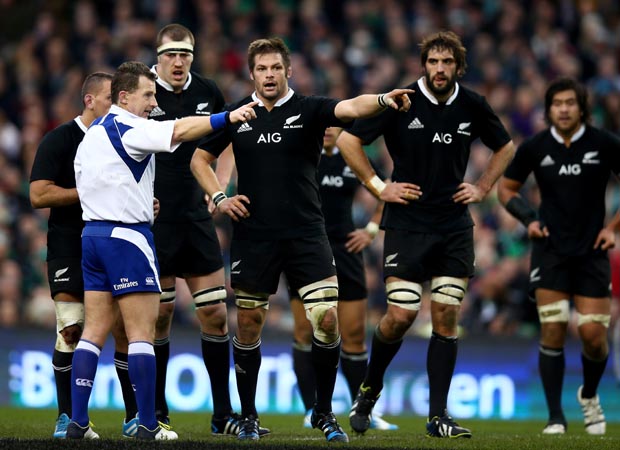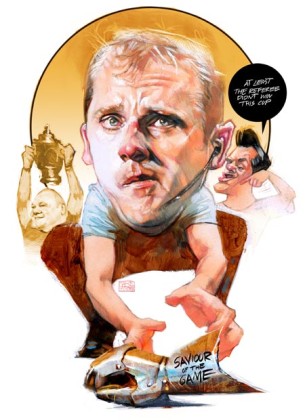
 Forget New Year wish lists, because where the current crisis in elite refereeing is concerned what we need is a hit list. Top of my 2015 hit list is that the World Cup final at Twickenham at the end of October is decided by the brilliance of a player, or team, rather than the whistle of the referee (or the convoluted ruling of a TMO).
Forget New Year wish lists, because where the current crisis in elite refereeing is concerned what we need is a hit list. Top of my 2015 hit list is that the World Cup final at Twickenham at the end of October is decided by the brilliance of a player, or team, rather than the whistle of the referee (or the convoluted ruling of a TMO).
What the game is crying out for is for the top referees in the world to do a U-turn. It means them telling Joel Jutge, the World Rugby/IRB’s match official manager, and the administrators in World Rugby‘s so-called Services department, that enough mistakes have been made and that the remedy has to start now.
It needs a Wayne Barnes to say that it is time to give the game back to the players, and to make referees an adjunct to the match action rather than assuming the role of an all-important central figure on the pitch.
Barnes is his own man, as he showed by being unwilling to kow-tow to New Zealand in their 2007 World Cup quarter-final against France.
It earned him death threats and notoriety, but he clearly felt that the rest of the refereeing fraternity had allowed the All Blacks to become a sacred cow, giving them a leeway that was not enjoyed by their opponents. His decision not to do so was as courageous as it was controversial.
Refereeing desperately needs an individual with character and conviction to challenge a refereeing culture which is in danger of making an almighty mess of the 2015 World Cup, and Barnes has the credentials to do so.
The stakes are high because the game has become a Rugby League hybrid – but one without the clarity of the officiating in the 13-man code.
Instead, what we have is confusion. Rugby Union has become a game in which the results of big matches are increasingly being decided by arbitrary decisions rather than consistent application of the laws.
Any sport in which international results can become a lottery decided on a Buggins’ turn approach to who should be penalised for dropping a scrum has to take urgent action.
The way the game has been officiated over the last decade has seen multiple refereeing failings become endemic, and they could come home to roost during the World Cup, damaging rugby’s showcase global event.
The lawmakers at World Rugby/IRB, and at the major national Unions, are culpable because they have created a chaotic situation in which refereeing consistency and common sense have become the exceptions rather than the rule.
Elite referees have been undermined because of a failure by World Rugby/IRB to recognise that the cardinal laws of the game have to be enforced. The most obvious of those cardinal laws apply at the scrum, where the rule is that the put-in has to be straight.
 However, by allowing senior referees to consistently ignore crooked feeds, the authority of the officiating system has been systematically eroded.
However, by allowing senior referees to consistently ignore crooked feeds, the authority of the officiating system has been systematically eroded.
The accompanying rot has spawned a generation of oversized hookers who cannot hook, scrum-halves who are flummoxed when they are penalised for putting the ball into the second row, and props who consider it legitimate to start pushing as soon as the referee has concluded the tedious ‘Crouch-Bind-Set’ sequence.
This has resulted in unstable scrummages, and continuous re-sets that take as long as three to four minutes for a single scrum to have an outcome, frustrating fans and players alike. This lamentable state of affairs sees almost half of all scrums end in the referee awarding a penalty, or a free-kick, as opposed to being completed as a genuine contest for possession.
What a farce – and all of it absolutely avoidable by applying the simple tried and tested blueprint enshrined in the law book. Namely:
1. Scrum square and heads and shoulders of the front-row above the hips.
2. No pushing before the put-in.
3. Scrum-half to put the ball in straight.
Now the rot has spread to the lineout. We have hookers persistently taking a late sideways shuffle to align with their own lineout. They then the throw the ball down their own line making it almost impossible for the opposition to contest it.
If that has turned another area of supposed contest into guaranteed ball for the side with the throw, the lineout mauls that follow them are another stacked deck.
By allowing the mauling side to have a phalanx of offside forwards to protect the ball-carrier – who is tucked in as the last man in the advancing unit – it has become virtually impossible to combat a well-set five metre lineout drive legally.
If the law reverted to the old maul rule that the ball had to be held by players in contact with the opposition, then you would again have a grappling contest instead of legalised obstruction.
Little wonder that the incidence of penalty tries being awarded from driving lineouts is increasing rapidly.
Add to that the endemic problem of players off their feet challenging for the ball at the breakdown, thereby creating static pile-ups, and rampant offside from chasers following kicks and defenders creeping a couple of feet ahead of the demarcation line, and you have a primed self-destruct mechanism.
Jutge says that a big part of his job, “is establishing guidelines and protocols in various aspects of the game, then discussing them with selectors, referee managers and referees to decide on policy”.
It’s not working Joel, and we need a clear, coherent and transparent plan to bring about a refereeing revolution. Otherwise, the World Cup will be all about men in the middle blowing their whistles rather than players creating an enthralling sporting spectacle.
The centralised World Rugby/IRB referee contracts revealed in our front page story are a way forward, but it is improvements on the pitch that count.


British and Irish Lions
Charlie Elliott: The 17 backs I would select for the British and Irish Lions
























You must be logged in to post a comment Login